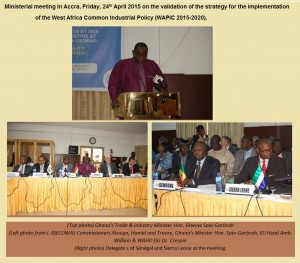
Ministers in charge of Industry and Quality in West Africa have resolved to promote the West Africa Common Industrial Policy (WACIP 2015-2020) and its implementation strategy as a veritable vehicle for accelerating the industrialization of the region.
In Resolutions and Declarations at the end of their two-day meeting in Accra, Ghana on Saturday 25th April 2015, the ministers adopted the Revised WACIP Strategy and the implementation governance framework of the Strategy, and resolved to promote Four Regional Priority Sectors under the project, namely, agro-industry and agribusiness, pharmaceutical industry, construction industry and automotive and machinery industries.
The ministers also urged the ECOWAS Commission to establish an “Eminent Persons Group” to help facilitate the implementation of WACIP and its strategy.
They further agreed “to intensify regional industrial cooperation and consultation framework to address the regional common challenges,” by among other measures, supporting the organization of the ECOWAS Industrial Forum starting from 2016, to promote regional industry, and the promotion of bilateral regional and multilateral industrial programmes and projects.
Other identified measures include participation at ECOWAS Industry meetings to address the status of development of industry in West Africa and to evaluate the implementation of WACIP, which was adopted by regional leaders in 2010.
The ministers also agreed to support the critical role of the private sector in creating jobs and income opportunities through industrial development, and to join efforts to promote the common market for industrial products, by supporting free movements and trade facilitation for locally manufactured products; fighting fraud and counterfeiting of manufactured products within the common market and promoting regional market surveillance against dumping.
In addition, they resolved to promote the ECOWAS industrial database linked with national databases and to harmonize and promote the regional market of locally manufactured products
The ministers equally called on Member States to allocate substantial budgets to National Industrial Plans and to create the enabling environment for local manufacturing of products at competitive prices.
While thanking development partners for their support to the WACIP implementation strategy, particularly the European Union, UNIDO, the German Government and the German National Metrology Institute, PTB, the World Bank Group and Helen Keller International, the regional ministers said continued support to WACIP would help fight poverty and insecurity, create jobs and ensure improved well-being of ECOWAS citizens and integration of the region into the global economy.
On the West Africa Quality Policy, the ministers called for the adoption of the conclusion of the Technical Management Committee and the Regional Harmonized Standards (ECOSTAN) on food and agricultural products, and urged the ECOWAS Commission to implement the Regional Quality Infrastructure Scheme.
While expressing support for the implementation of the Regional Pharmaceutical Plan 2014-2020, the ministers encouraged the Commission and the West African Health Organization (WAHO) to mobilize partners for the successful implementation of the plan and the regional production of safe and efficacious medicines. ECOWAS Member States are also urged to take all necessary measures to implement the regional pharmaceutical plan.
The ministerial session preceded by a three-day experts’ meeting was chaired by Ghana’s Minister of Trade and Industry, Honourable Ekwow Spio-Garbrah who in his opening address urged the region to leverage its abundant human and natural resources with creativity and innovation to accelerate industrialization, economic development and regional integration.
The ECOWAS Commissioner for Industry and Private Sector Promotion, Mr, Kalilou Traore said the implementation of WACIP would enhance the region’s economic competitiveness and enterprise, harmonization of national industrial policies and standards, boost resource mobilization for accelerated industrialization, economic development and regional integration.
Participants at the meetings included ministers in charge of Industry and Quality of ECOWAS Member States, National industry experts, ECOWAS Standard Harmonization Technical Monitoring Committee Bureau, representatives of National Manufacturers Associations, Chambers of Commerce and Industry, technical and financial partners, including the World Bank Group, Food and Agricultural Organization (FAO), UNIDO, and the UN Economic Commission for Africa (UNECA).
Others were representatives of regional and continental organizations – UEMOA, African Union and the ECOWAS Bank for Investment and Development (EBID) and WAHO – as well as regional business associations.
Directorate of Communication |




